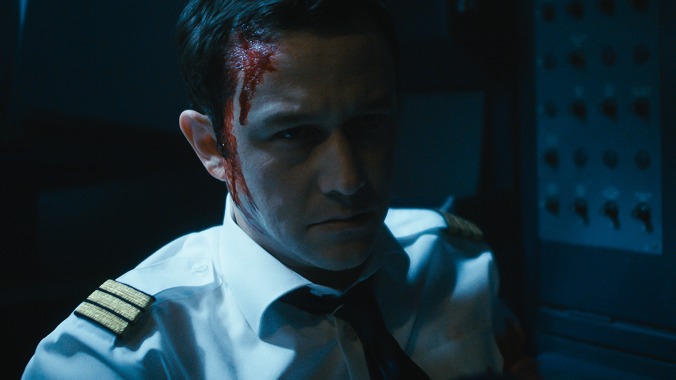Joseph Gordon-Levitt can’t pilot around the outdated fear-mongering of hijack thriller 7500


The first wave of anxiety arrives with the opening shot, a quiet stretch of mid-quality surveillance footage of an airport in Berlin. It doesn’t take long before our focus is pulled to a man, possibly Middle Eastern, standing in a crowd of eager travelers, and then another suspiciously emerging from a nondescript hallway with a newly acquired backpack, and yet another solemnly waiting for his flight. If the dread builds from there, it’s informed less by the promise of danger than the recognition of a very culturally dated trope—namely, the use of Muslims as bogeymen extremists. It’s a stain on this otherwise fairly inventive debut for writer-director Patrick Vollrath.
7500 strays from your typical hijack drama more in its execution than its premise. The story hits some familiar beats seen in other plane thrillers. A mild-mannered junior pilot, Tobias Ellis (Joseph Gordon-Levitt), is suddenly thrust into the role of reluctant hero when a group of Muslim terrorists manages to briefly usurp control of the plane and mortally wound the captain (Carlo Kitzlinger). Tobias, who is limited by his own serious injury, works to balance his fear with his sudden responsibilities as first in command of the aircraft while desperately attempting to seek middle ground with the only seemingly amenable attacker, Vedat (Omid Memar). Adding to the distress is Tobias’ life partner and colleague, Gökce (Aylin Tezel), who remains especially vulnerable just outside of the cockpit doors. With all of the elements in place—including personal tragedy and an opportunity to appeal to an enemy’s better nature—it’s not too difficult to anticipate Vollrath’s flight pattern.
Still, relegating most of the action to the cockpit effectively bolsters the intensity of a dangerous ordeal at 30,000 feet. Since the story is told almost entirely from Tobias’ perspective, communication and visibility are restricted to a staticky phone and a black-and-white overhead surveillance monitor, which offer mere hints of the horrors taking place in the cabin. Vollrath’s uncomfortably vérité approach also involves presenting the situation in real time—a choice that results in some narrative lulls (always an inherent risk of that strategy) but also some extra layers of anxiety, as when Tobias informs the passengers that they will commence with an emergency landing in 20 minutes. (So much, after all, can happen in 20 minutes.) The attackers’ steady pounding at the cockpit door and the occasionally ambient screaming also heighten the alarm, at least until the sounds recede into the background. That’s a wholly different kind of horror: growing accustomed to the madness.
Few characters emerge over this 92-minute descent into chaos. Thankfully, Gordon-Levitt and Memar solidly hold the center, rolling grief, uncertainty, hopelessness, and desperation into their taut exchanges. The circumstances don’t exactly provide many opportunities for their dynamic to grow beyond “attacker and hostage,” but the two do share some organic human moments—particularly when trading details of their personal lives—that momentarily elevate them beyond their respective stations. Neither portrayal really challenges the subgenre, but nor do the performances weigh it down with forced emotional displays or overblown heroics.
Yet just as Tobias can’t escape the tragedy unfolding just beyond the cockpit door, 7500 struggles to overcome some unfortunate and very outdated optics. Depicting Muslims as terrorists is not only well-worn nearly 19 years after 9/11 but also dangerous in a climate where Islamophobia is being fortified by those in power. No amount of heart-to-hearts or attempts to humanize Vedat can erase the damaging stereotypes. Why not challenge the status quo instead of falling back on fear-mongering tradition? It detracts from an otherwise refreshing take on the airplane thriller. Resonant mostly in its cleverly restricted point of view, 7500 will hopefully look, in hindsight, like an early patch of turbulence in an otherwise imaginative career.